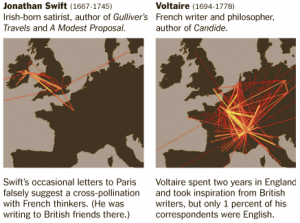The next big idea is data according to a New York Times article, Humanities Scholars Embrace Digital Technology by Patricia Cohen (November 16, 2010.) The article reports on some of the big data interpretation projects like those funded by the Digging Into Data program like the Mining with Criminal Intent project I am on.
Members of a new generation of digitally savvy humanists argue it is time to stop looking for inspiration in the next political or philosophical “ism” and start exploring how technology is changing our understanding of the liberal arts. This latest frontier is about method, they say, using powerful technologies and vast stores of digitized materials that previous humanities scholars did not have.
I’m not sure this is a new generation as we have been at this for a while, but perhaps the point is that the new generation is now looking away from theory towards the large-scale data issues.
What stands out about the projects mentioned and others is that the digital humanities and design fields are developing new and subtler forms of large-scale data mining and interpretation that use methods from other disciplines along with a sensitivity to the nature of the data and the questions we want to ask. The image above comes from Stanford’s Visualization of Republic of Letters project. There is nothing new about visualization or network analysis, but digital humanists are trying to adapt methods to messy human data – in other words interpreting the really interesting stuff so that it makes sense of something to someone.
Perhaps we may be able to show that following theses are true and important to the broader community:
- Interesting data has to be interpreted to be interesting. Someone has to pose the questions that make data useful.
- There is too much of data and it is messy; therefore it can’t by interpreted automatically. Real world analysis always involves questions, choices, data curation, mixing techniques, and iterative interpretation of results to generate knowledge.
- Interesting data always has to be explained to someone in some context. Results are only useful knowledge if they are published in some fashion that makes them accessible to an intended audience.
- Humanists have been the curators and interpreters of information which is why the subtle skills of questioning, curating, editing, analyzing, interpreting and representing are all the more needed now. Without humanists (and I include librarians and archivists in this category) who are comfortable with digital data and methods we will have only too much data and too many unused tools.
Thanks to Judith for pointing me to this NYT article.
